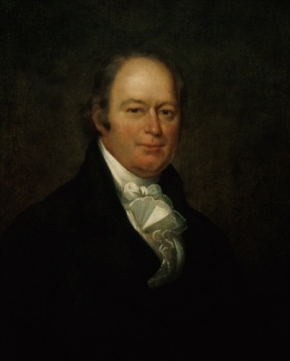You are here
Circuit Court Opinions:
Associate Justice William Johnson, Jr., Elkison v. Deliesseline (1823)

Elkison v. Deliesseline, 8 F. Cas. 493 (C.C.D.S.C. 1823) (No. 4,366) [Sixth Circuit]
Justice Johnson’s opinion in Elkison was the first significant judicial interpretation of the Constitution’s Commerce Clause as a restriction on state legislative power. The case arose from an 1822 South Carolina statute, the Negro Seamen Act, which provided that all free African Americans or people of color on ships arriving at the port of Charleston were to be detained until the ship left port. The legislature was motivated by discovery the same year of Denmark Vesey’s alleged plan to lead a slave revolt, which caused Charleston slaveholders to fear the prospect of free black men like Vesey intermingling with the enslaved. Under the act, ships’ captains were responsible for paying the costs of their sailors’ detention, and if they did not pay, the detainees would be sold into slavery. Elkison, a Jamaican-born British subject held under the statute, petitioned the U.S. circuit court for a writ of habeas corpus, and the case came before Johnson, a Charleston native.
Johnson ruled that the Act was unconstitutional because it conflicted with the federal government’s power to regulate commerce. The statute, he wrote, “is altogether irreconcilable with the powers of the general government; … it necessarily compromits the public peace, and tends to embroil us with, if not separate us from, our sister states; in short, and it leads to a dissolution of the Union; and implies a direct attack upon the sovereignty of the United States.” Johnson also noted that the detention of a British seaman contravened the terms of an 1815 commercial treaty with Great Britain which, like the Constitution, was the supreme law of the land. Even the federal government, he asserted, could not have passed a law such as the South Carolina statute “without furnishing a just cause of war.”
Despite ruling the statute unconstitutional, Johnson recognized that he could not issue a writ of habeas corpus because the Judiciary Act of 1789 gave federal courts power to issue the writ in cases where prisoners were held under federal, but not state, authority. Johnson’s opinion provoked great controversy in Charleston, the white citizens of which condemned it almost universally. Local newspapers refused to print the opinion, so Johnson had it printed as a pamphlet. He wrote several letters to the newspapers under a pseudonym to respond to attacks on his opinion. South Carolina, presaging later debates over nullification, ignored Johnson’s ruling and continued to enforce the act. Protests from British authorities to Secretary of State John Quincy Adams were likewise unavailing. The legislature removed the provision regarding enslavement in 1823, reenacted it in 1835, and removed it once more in 1856.
